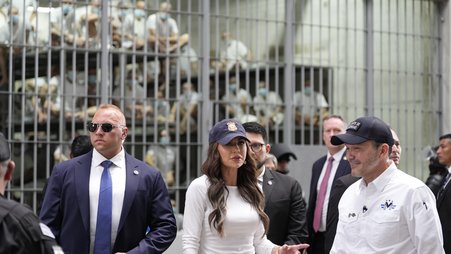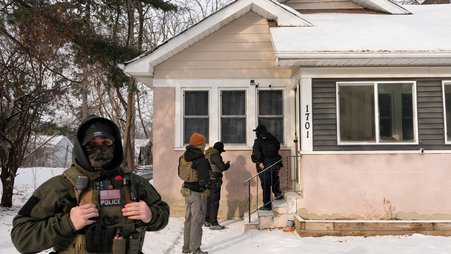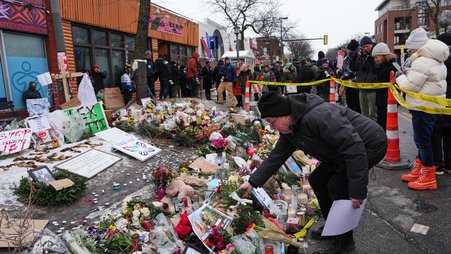Hillary Clinton made her first extended public remarks about Edward Snowden late last week, and unfortunately she misstated some basic facts about the NSA whistleblower and how events have played out in the last year. Here’s a breakdown of what she said and where she went wrong:
Clinton: "If he were concerned and wanted to be part of the American debate, he could have been… I don't understand why he couldn't have been part of the debate at home."
This is one of the biggest misconceptions about Snowden that even NSA reform advocates have furthered. Edward Snowden could not be part of this debate at home, period.
First, as Pentagon Papers whistleblower Daniel Ellsberg explained in the Washington Post, Snowden would likely be in a maximum security prison right now if he remained in the United States, unable to speak to the media. Second and more importantly, Snowden would likely be barred from making any of arguments claiming he was a whistleblower during his trial, since the government is charging him under the draconian Espionage Act of 1917. As we have pointed out repeatedly, lower court rulings in other cases against leakers have prevented defendants from telling a jury about their intent to inform the American public, the lack of harm their leaks caused, and the benefits to society. The government even tried to bar NSA whistleblower Thomas Drake from mentioning the words “whistleblower” or “First Amendment” during his trial.
Simply put, it would be impossible for Edward Snowden to participate in an informed debate in the public or the courtroom if he was in the United States.
Clinton: "When he emerged and when he absconded with all that material, I was puzzled, because we have all these protections for whistleblowers."
What’s really puzzling is that Ms. Clinton—and President Obama (who has made similar remarks)—is not familiar with the current state of the law as it relates to whistleblowers. Contractors like Snowden lack the protections that federal employees are entitled to, and the government is free to retaliate against such people under the law. As Angela Canterbury, director of public policy at the Project on Government Oversight, has explained: “[T]here is a gaping loophole for intelligence community contractors. The riskiest whistle-blowing that you can possibly do on the government is as an intelligence contractor.”
Despite the risks, Snowden has said he repeatedly went his superiors with complaints and they were never acted upon. From his interview with Vanity Fair:
“The N.S.A. at this point not only knows I raised complaints, but that there is evidence that I made my concerns known to the N.S.A.’s lawyers, because I did some of it through e-mail. I directly challenge the N.S.A. to deny that I contacted N.S.A. oversight and compliance bodies directly via e-mail and that I specifically expressed concerns about their suspect interpretation of the law, and I welcome members of Congress to request a written answer to this question [from the N.S.A.].”
Clinton: "I have a hard time thinking that somebody who is a champion of privacy and liberty has taken refuge in Russia under Putin's authority."
Snowden did not “take refuge” in Russia at all, and in fact, it’s the fault of the United States government he was stuck there. Snowden’s legal adviser Ben Wizner put it best when asked about this on Meet the Press last year:
I actually think if there is one thing that we all should agree on, it’s that Edward Snowden shouldn’t be in Russia. The reason why he’s in Russia is that the United States revoked his passport when he was transiting through there. And I hope that the U.S. will-- will see that it’s not in anybody’s best interests for him to be there, and that even if he isn’t going to return here, that there should be some other place where he can live.
Clinton: "I think turning over a lot of that material—intentionally or unintentionally, because of the way it can be drained—gave all kinds of information, not only to big countries, but to networks and terrorist groups and the like."
Snowden has repeatedly stated he did not turn over information to anyone besides journalists, he did not even take any data with him to Russia, and the US government has not put forth any evidence that a foreign government has gained access to information that is not in the public record. Thankfully, Snowden is highly trained in protecting data in high-risk places, as he even once taught a DIA course in the subject to other diplomats.
Ms. Clinton is widely considered the front-runner for the Democratic nomination for President in 2016. It’s very possible she was just testing the waters about how to react to the issue of NSA surveillance. We hope she will take these facts into consideration and adjust her opinion accordingly. Bill Clinton was much more conciliatory and nuanced about people's anger over the NSA when he made comments a few weeks ago, so it would be easy for her to switch gears. And if these tweets are any indication, privacy could be a more important election issue than ever.
Note: Edward Snowden is a member of Freedom of the Press Foundation's board of directors.




